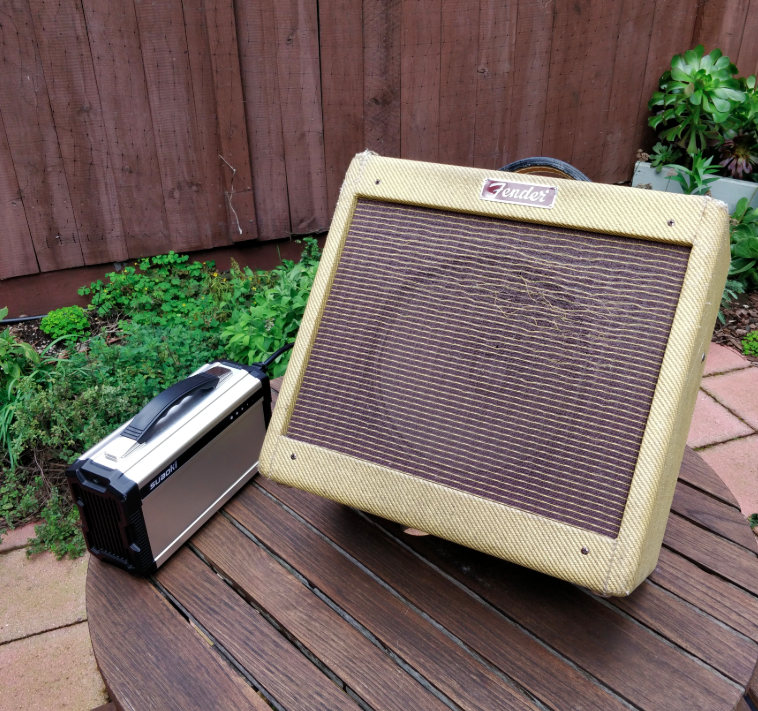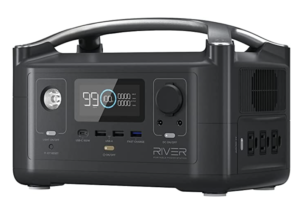Here’s a question I’ve seen come up again and again: “Which battery-powered amp should I get?”

In my past life as a software engineer, I learned this lesson quickly: asking the wrong question often yields the wrong solution.
In the early days, I’d nervously walk up to a more experienced engineer and start rattling off a hyper-specific algorithmic question, probably while fingering exact lines of code on the laptop cradled in my arms. My thought process was this: I need to prove that I have been really digging through the weeds and whittle my question down to something unambiguous to save their precious time while saving face. After some confusing back-and-forth I’d usually get the quizzical response, “what exactly is the problem you’re trying to solve?”
That, as it turns out, is first question I should have been asking. In the end, the more-experienced engineer would likely just google a term I had never heard of that precisely describes my problem, and present me with a handful open-source libraries (or a stack overflow post) that already solved it. Turns out all my prior digging was unnecessary. I got a better solution from a different angle.
In this case, the problem is perhaps this: I’m playing a rustic wedding ceremony while floating on an artisanal hand-whittled raft in the middle of a frog pond for a small audience of 50… this is purely hypothetical–I can’t swim and I’d probably turn down this gig.
In summary: I want to amplify my guitar without access to a power outlet. Now I might think, “clearly I need a battery-powered amp. Now which is the least-crappy sounding battery-powered amp and how much does it cost?” Wrong questions! How about: how do I power an amp without access to a power outlet?
With the same lithium battery technology used in electric cars and smartphones this is now possible in a package as small as a lunchbox.
These batteries are usually branded for camping/emergency use and include a standard 120V mains outlet. Various models are all over Amazon, but I got the best one I’ve found is this one by Ecoflow.

It charges fast (under two hours) has multiple USB and outlet ports and is supplies 288 watt hours. So if your amp is 60 watts, you can power it for almost 5 hours (288 / 60 = 4.8). But the real figure is much more, because your amp probably only uses 60 watts at full volume. If you’re like me, playing at full volume, or even anywhere near it, never happens.
I’ve powered my AER Alpha for multiple 2-3 hour gigs without recharging. I’ve also put some 15-watt tube amps through it, like my Fender Princeton Reverb. I’ve even plugged in power strips and powered multiple devices. I’ve loaned it to a buddy who powered a PA speaker (QSC K10) with it.
The only issue I’d report is that there can be some noise interference due to the transformer in the power supply. Be sure to move it a few feet away from the amp. Also, single-coil pickups tend to hum more when not touching the strings since there isn’t grounding to speak of. If anyone knows a solution to this, let me know. Although, perhaps I’m asking the wrong question 🙂
Update!: I’ve found that this model by ecoflow is much better at managing noise and also has much more features. I barely get any added hum on my dearmond FHC pickup. I believe this has to do with providing a pure sinusoidal power signal.
Warning from a reader 9/26/2022: “I would never risk running a tube amp off of one of these power supplies outside. Without a proper ground you’re taking a daring step. Tube amps run very high voltage internally with current levels in the ‘no return zone’ meaning, getting zapped while playing in the outdoors could be that final gig.” (These days I only use solid-state amps through these things which is much safer overall, tube amps also drain the batteries very fast in comparison. -v)
If you MUST get a battery-powered amp, I’d recommend something from Roland’s CUBE series. They run on AA batteries for a truly impressive amount of time and volume. Don’t bother with stuff with heavy, proprietary sealed-lead-acid batteries. Guess what, if you forgot to charge it you’re out of luck. If some ubiquitous AA batteries ran out, you can solve that problem much more easily.
You’re the man Vic! Thanks. Gonna pick one up 🙂
As a professional writer and semi-pro guitarist who plays lots of outdoor party settings… and someone trying to solve this exact problem… I would like to say that this is the best-written, most thoughtful answer to a common question that I have seen. Bravo and thanks.
What a compliment! Glad to help
Please help! I (very cheaply, at least) purchased a Roland AC-60 amp, foolishly assuming that it would be AC-DC b/c my AC-33 has that capability. The news here about an external battery is quite encouraging and my only question: how does one use it w/the amp? Is there some kind of line out for alternate current? I’m hoping against hope and if the answer is no I probably will cancel my purchase…
I think you might be overthinking this. Any amp with a wall plug should work fine with this battery. It’s basically a 120V AC power outlet in a box.
Edit: If you’re confused looking at the jack on this battery, it does accept 3-prong AC power plugs. It might look weird because it’s one of those universal international plug jacks
Hey man, I’m looking into getting a blues Jr for busking with a portable amp, Any idea how long this will last? Cheers =)
This is all explained in the article, basically you take the watt hour rating of the battery (250 watt hour) and divide by the wattage of your amp (15 watts for a blues jr). That means it could potentially last 16.6 hour on a full charge. Though I have never put this to the full test. I can confirm I’ve run my pro jr. (Also 15w) for 3-hour gigs
If a class A amplifier is used it will pull the full 60 watts continuously. Class A/B will pull less, ( also loss in tone quality), and class D will pull the least amount of power.
I would never risk running a tube amp off of one of these power supplies outside. Without a proper ground you’re taking a daring step. Tube amps run very high voltage internally with current levels in the ‘no return zone’ meaning, getting zapped while playing in the outdoors could be that final gig. Thanks to the modern miracle of switching-amplifier chips, there are now more and more powerful amps available, designed specifically for outdoor and off-grid gigs. Class-D power amps are starting to appear in portable PAs that can handle multiple instruments. (and mics) Portable guitar amps with either modeling software preamps or FET-modeled preamps are also available. The portable PAs I’ve seen come equipped with high capacity lithium batteries. Why take risks using potentially lethal gear that wasn’t intended to be used outdoors? Would you run an electric toaster oven or an electric range when you’re out picnicking or camping?
Salient advice. I will update the post with your warning. I personally only do this with solid-state amplifiers now. The last time I tried an old tube amp it drained the battery within 45 minutes and gave me a bad feeling. With a class D solid state amp, 2 hours only drains the battery about 25% with plenty of volume
So whick model is better at managing noise, the River or River 2? I assume the River 2. Thank you.
I use the River 1 and it’s great. I imagine you’d be fine with either. They use the same tech.
Question out there… anyone tried a ZT Lunchbox Reverb or earlier model through the River 2? Seems like it’d be a great combo for portability, but then the lunchbox runs 100w and if I use the extension cab it’s 200w – given the river 2’s 256 w hours rating, sounds like maybe an hour at a time. Any thoughts?
I don’t think any of these amps run at 100W power consumption. The 100W figure is RMS wattage. I own a first generation ZT lunchbox, cranked it up to 75% and the River 2 reports 22W and 10-15 hours of life. I cant speak to having it with an extension cabinet.
Okay so I am confused on the comments warning about running a Blues Jr. tube amp through a portable battery. I am planning to busk with one along with a pedal board with 5 boss pedals plugged into the battery too. Am I going to like explode and die? or can the battery handle it? Even if I get a higher watt battery? I need this answer please.
Haha! The answer is yes, if water closes a circuit on your setup you could be electrocuted with a lethal current!
BTW, I use an 88Wh battery that cost $100 to power my pedalboard and I use a 100w Fender GO for busking.
Wow scaremonger. Nobody wants dangers to musicians. But a faulty earth at any venue could be lethal. I have had many shocks on stage over the years. Mainly from microphones and PA systems. Be careful but don’t get paranoid.
I wonder how long the batteries can be charged and if they can be replaced. A search of the amazon questions seems to imply the batteries on this unit cannot be replaced. I like the idea of using my favorite amp with a separate battery unit, but I’d prefer a unit that has a non-proprietary battery replacement option for when they discontinue the model.
Man, honestly how did I not think of this before! Can you recommend some other power stations that I could get in the Netherlands? Thanks!
So from what I understood any amp that uses standard power plug will work with this? I just bought a THR10ii (not the wireless one) and wondering if I’ll ruin it by plugging it in a power supply. Thanks for all the info!
I’ve ran a 18 watt Marshall clone off a portable power supply no problem. Even better the power supply fits in the back of the combo making it ultra portable. Ive had no problems with shock hazard and my 12 watt Gibson amp doesn’t even have a ground plug. Run wireless if your scared and then you only have to touch your amp for adjustment and switches. I’m personally more afraid of wall power than battery systems if you’ve ever seen a welder in action.